Profile: Gen. Yoweri Museveni
These days, political pundits across the continent call Museveni an African Bismarck, others refer to him as Africa's "other statesman," second only to the venerated South African President Nelson Mandela.
PROFILE|GEN. MUSEVENI|2021 POLLS
Yoweri Kaguta Museveni was born on September 15, 1944, in Kyamate, Ntungamo district. He has been President of Uganda since 1986.
Who is Museveni?
Museveni was born on 15 September 1944 in Rukungiri, to Mzee Amos Kaguta, a cattle herder, and Esteri Kokundeka Nganzi. Museveni attended Kyamate Elementary School, Mbarara High School, and Ntare School. In 1967, he went to the University of Dar es Salaam in Tanzania. There, he studied economics and political science and was involved in radical Pan-African politics.
While at university, he formed the University Students' African Revolutionary Front and led a student delegation to FRELIMO territory in Portuguese Mozambique, where he received guerrilla training.
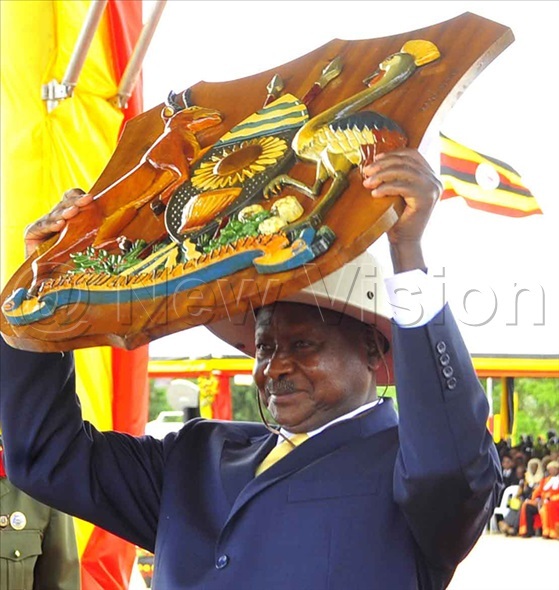
Studying under the leftist Walter Rodney, among others, Museveni wrote a university thesis on the applicability of Frantz Fanon's ideas on revolutionary violence to post-colonial Africa.
In September 1972, Museveni was one of the people who took part in the attack of Uganda from Tanzania. He led the team that attacked Mbarara barracks and suffered heavy casualties at the hands of Amin's soldiers.
In October, Tanzania and Uganda signed the Mogadishu Agreement that denied the rebels the use of Tanzanian soil for aggression against Uganda.

Museveni broke away from the mainstream opposition and formed the Front for National Salvation in 1973. In August of the same year, he married Janet Kataha.
The FRONASA force fought Amin, taking the western axis, while Kikoosi Maluum took the central axis matching on through Mutukula, Masaka, and onto Kampala.
After the overthrow of Amin on April 11, 1979, a caretaker government led by Yusuf Lule took over in which Museveni served as the defence minister.
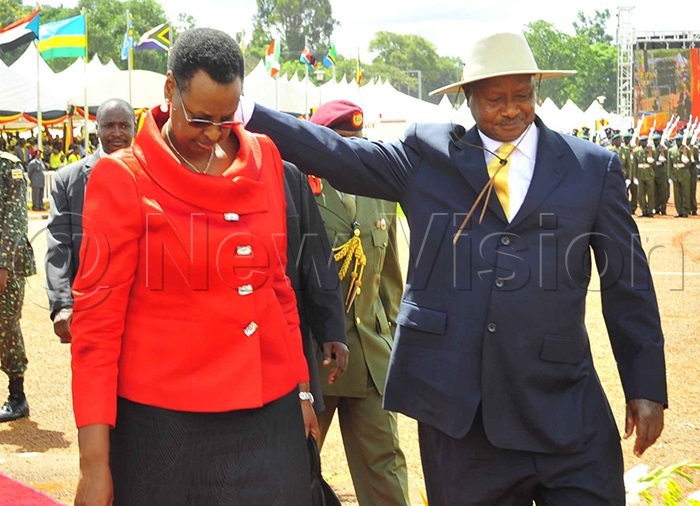
He was later relieved of this position by new president Godfrey Binaisa as the country prepared for elections in December 1980. Museveni took part in the elections under the Uganda Patriotic Movement. The elections, although disputed, returned Milton Obote as president.
Museveni led a team of 41 people with 27 guns to launch another war on February 6 1981 at Kabamba in Mubende district.
His Popular Resistance Army forces later merged with former president Yusufu Lule's fighting group, the Uganda Freedom Fighters, to create the National Resistance Army (NRA) with its political wing, the National Resistance Movement (NRM).
Two other rebel groups, the Uganda National Rescue Front (UNRF) and the Former Uganda National Army (FUNA), engaged Obote's forces. The FUNA was formed in the West Nile sub-region from the remnants of Amin's supporters.
On 27 July 1985, sub-factionalism within the Uganda People's Congress government led to a successful military coup against Obote by his former army commander, Lieutenant-General Tito Okello Lutwa.
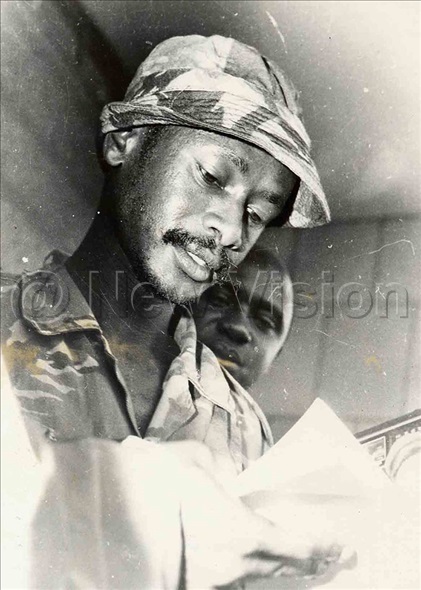
Although it seemed like the NRM/NRA's revolution for which they had fought for four years had been hijacked by the UNLA military junta, they agreed to peace talks presided over by a Kenyan delegation headed by President Daniel Arap Moi.
The talks, which lasted from 26 August to 17 December, were notoriously acrimonious and the resultant ceasefire broke down almost immediately.
The final agreement, signed in Nairobi, called for a ceasefire, demilitarisation of Kampala, integration of the NRA and government forces, and absorption of the NRA leadership into the Military Council. These conditions were never met.
While involved in the peace negotiations, Museveni was courting General Mobutu Sésé Seko of Zaire to forestall the involvement of Zairean forces in support of Okello's military junta.
On 20 January 1986, however, several hundred troops loyal to Amin were accompanied into Ugandan territory by the Zairean military. The forces intervened following secret training in Zaire and an appeal from Okello 10 days earlier.
By 22 January, government troops in Kampala had begun to quit their posts en masse as the rebels gained ground from the south and south-west.
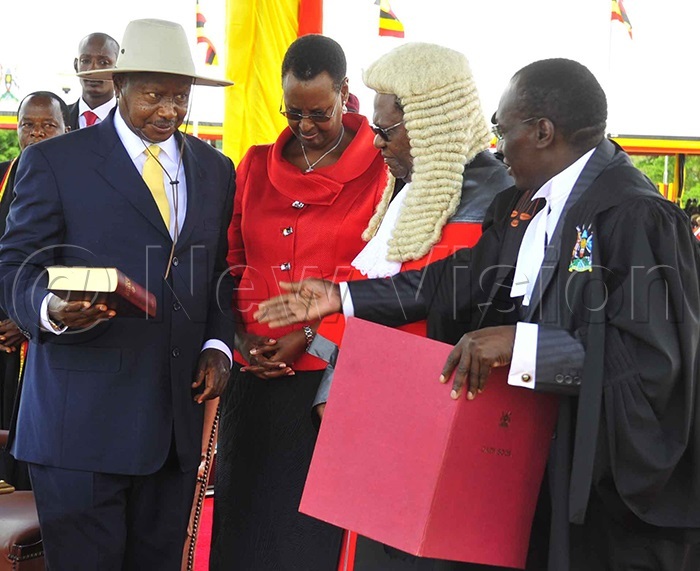
And on January 26, 1986, Kampala city fell in the hands of the rebels. Museveni was sworn in as president on January 29. "This is not a mere change of guard, it is a fundamental change," said Museveni, after a ceremony conducted by British-born Chief Justice Peter Allen.
Speaking to crowds of thousands outside the parliament building, the new president promised a return to democracy: "The people of Africa, the people of Uganda, are entitled to a democratic government. It is not a favour of any regime. The sovereign people must be the public, not the government."
Uganda began participating in an IMF Economic Recovery Program in 1987. Its objectives included the restoration of incentives to encourage growth, investment, employment, and exports; the promotion and diversification of trade with particular emphasis on export promotion; the removal of bureaucratic constraints and divestment from ailing public enterprises to enhance sustainable economic growth and development through the private sector; and the liberalisation of trade at all levels.
The NRM came to power promising to restore security and respect for human rights. Indeed, this was part of the NRM's ten-point programme.
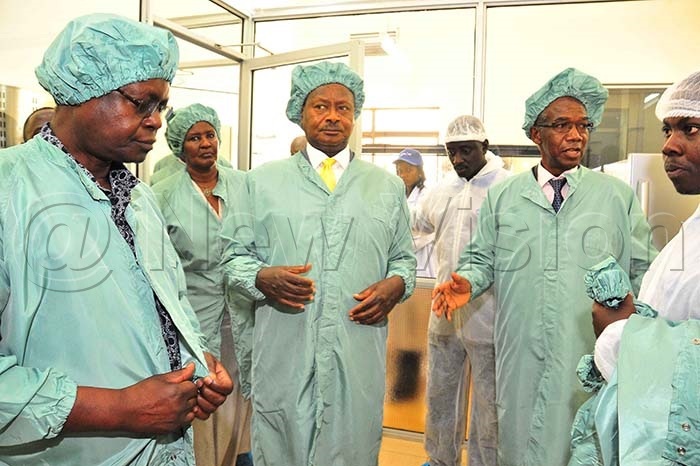
The second point on our programme is the security of person and property. Every person in Uganda must (have absolute) security to live wherever he wants. Any individual, any group that threatens the security of our people must be smashed without mercy.
The people of Uganda should die only from natural causes which are beyond our control, but not from fellow human beings who continue to walk the length and breadth of our land.
The NRA subsequently earned a reputation for respecting the rights of civilians, although Museveni later received criticism for using child soldiers.
First direct elections
The first elections under Museveni's government were held on 9 May 1996. Museveni defeated Paul Ssemogerere of the Democratic Party, who contested the election as a candidate for the "Inter-party forces coalition", and the upstart candidate Kibirige Mayanja. Museveni won with 75.5 percent of the vote from a turnout of 72.6 percent of eligible voters.
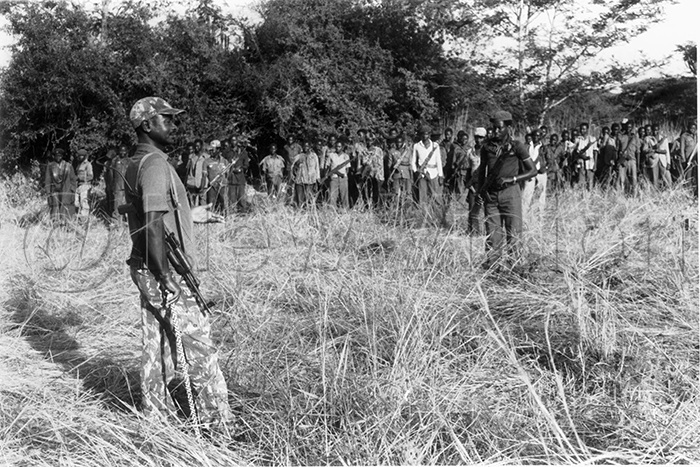
Although international and domestic observers described the vote as valid, both the losing candidates rejected the results. Museveni was sworn in as president for the second time on 12 May 1996.
Museveni was elected chairperson of the Organisation of African Unity (OAU) in 1991 and 1992.
Fighting HIV
Perhaps Museveni's most widely noted accomplishment has been his government's successful campaign against AIDS. During the 1980s, Uganda had one of the highest rates of HIV infection in the world, but now Uganda's rates are comparatively low, and the country stands as a rare success story in the global battle against the virus (see AIDS in Africa).
One of the campaigns headed by Museveni to fight against HIV/AIDS was the ABC program.
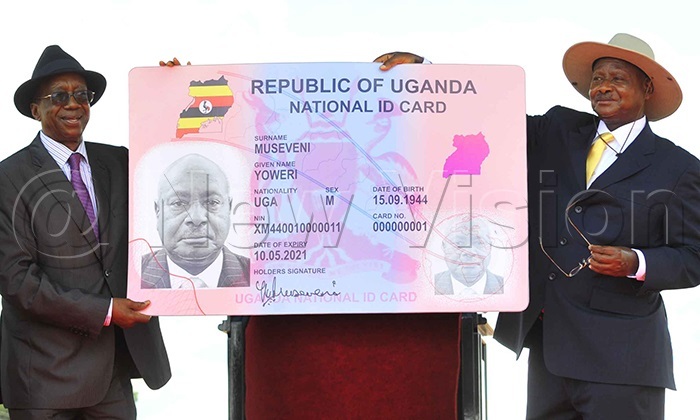
The ABC program had three main parts "Abstain, Be faithful, or use Condoms if A and B are not practiced."[30] In April 1998, Uganda became the first country to be declared eligible for debt relief under the Heavily Indebted Poor Countries (HIPC) initiative, receiving some US$700 million in aid. [31]
Affirmative action
Museveni was lauded for his affirmative action programme for women in the country. He was served by a female vice-president, Specioza Kazibwe, for nearly a decade, and has done much to encourage women to go to college.
On the other hand, Museveni has resisted calls for greater women's family land rights (the right of women to own a share of their matrimonial homes). [32]
Commendation
The New York Times in 1997 said Museveni was in a new class of African statesman, second to Nelson Mandela.
These are heady days for the former guerilla who runs Uganda. He moves with the measured gait and sure gestures of a leader secure in his power and his vision. It is a little wonder.
To hear some of the diplomats and African experts tell it, President Yoweri K. Museveni started an ideological movement that is reshaping much of Africa, spelling the end of the corrupt, strong-man governments that characterized the cold-war era.
These days, political pundits across the continent are calling Mr. Museveni an African Bismarck. Some people now refer to him as Africa's "other statesman," second only to the venerated South African President Nelson Mandela.
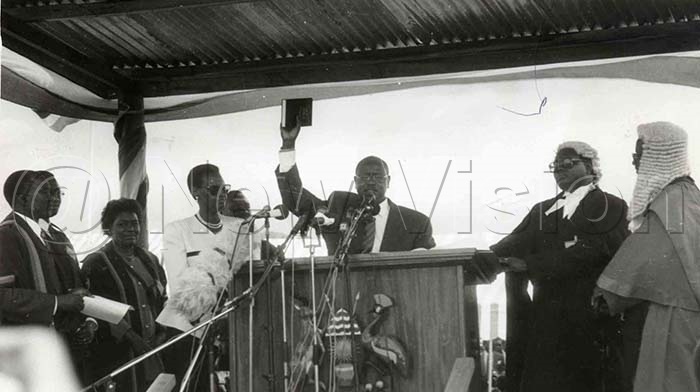
2001 elections
The second set of elections were held in 2001. President Museveni got 69 percent of the vote to beat his rival Kizza Besigye. Besigye had been a close confidant of the president and was his bush war physician.
They, however, had a fallout shortly before the 2001 elections, when Besigye decided to stand for the presidency. The 2001 election campaigns were a heated affair.
The election culminated in a petition filed by Besigye at the Supreme Court of Uganda. The court ruled that the elections were not free and fair but declined to nullify the outcome by a 3-2 majority decision.
The court held that although there were many cases of election malpractice, they did not substantially affect the result. Chief Justice Benjamin Odoki and Justices Alfred Karokora and Joseph Mulenga ruled in favour of the respondents, while Justices Aurthur Haggai Oder and John Tsekoko ruled in favour of Besigye.
There were much recrimination and bitterness during the 2001 presidential elections campaign, and incidents of violence occurred following the announcement of the win by Museveni.
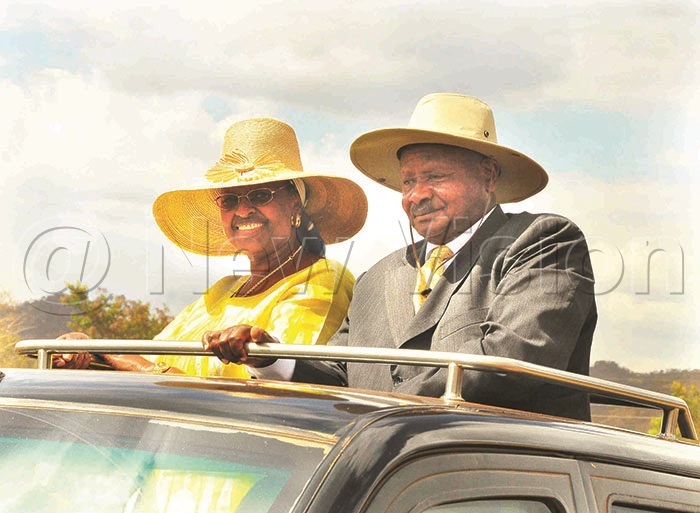
Return to multipartism
In July 2005, a constitutional referendum lifted a 19-year restriction on the activities of political parties. In the non-party "Movement system" (so called "the movement") instituted by Museveni in 1986, parties continued to exist, but candidates were required to stand for election as individuals rather than representatives of any political grouping.
This measure was ostensibly designed to reduce ethnic divisions, although many observers have subsequently claimed that the system had become nothing more than a restriction on opposition activity.
However, some Ugandans saw Museveni's conversion to political pluralism as a concession to donors - aimed at softening the blow when he announces he wants to stay on for a third term.
February 2006 elections
On 17 November 2005, Museveni was chosen as NRMs presidential candidate for the February 2006 elections.
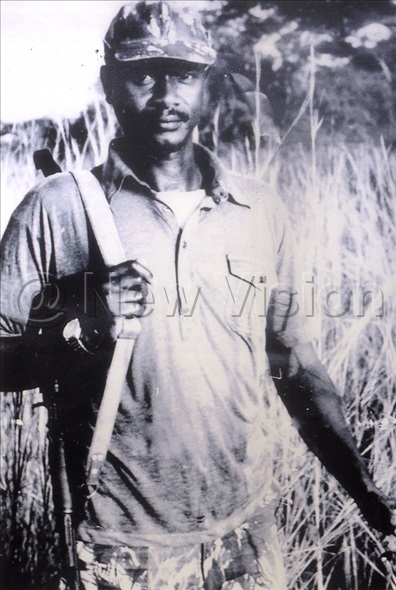
The arrest of the main opposition leader Kizza Besigye on 14 November - charged with treason, concealment of treason, and rape - sparked demonstrations and riots in Kampala and other towns.
On 2 January 2006, Besigye was released after the High Court ordered his immediate release.
The 23 February 2006 elections were Uganda's first multi-party elections in 25 years and were seen as a test of its democratic credentials.
Although Museveni did worse than in the previous election, he was elected for another five-year tenure, having won 59 percent of the vote against Besigye's 37 percent. Besigye alleged fraud and rejected the result.
Fourth term (2011-2016)
Museveni was re-elected on 20 February 2011 with a 68 percent majority with 59 percent of registered voters having voted.
2016 election
The presidential candidates included incumbent Yoweri Museveni, in power since 1986, and Kizza Besigye, who complained of rigging and violence at polling stations. Voting was extended in several locations after reports of people not being able to vote. Museveni was re-elected (18 February 2016) with 61 percent of the vote to Besigye's 35 percent.
2018 age limit bill
President Yoweri Museveni, as the incumbent president of Uganda, signed the Constitutional Amendment Bill No. 2 2017, commonly known as the "Age Limit" bill on December 27, 2017.
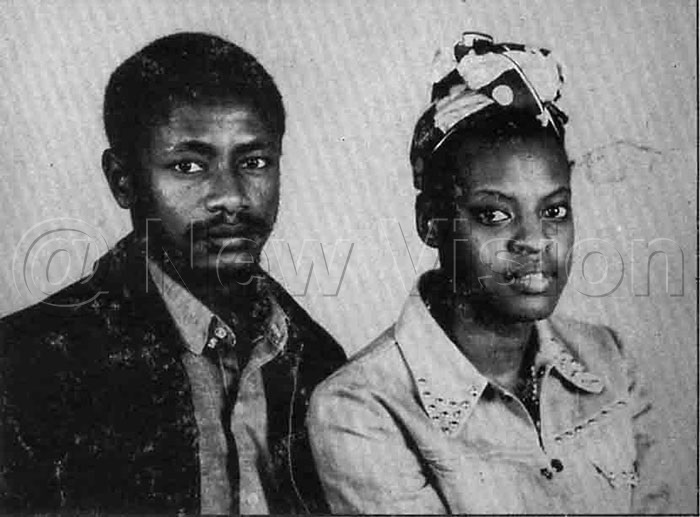
The bill was successfully passed by the 10th Parliament of Uganda on December 20, 2017. As of December 27, 2017, following articles 259 and 262 of the Constitution of Uganda, the bill has effectively amended the Constitution to remove the presidential age limit caps.
Effects of change to the bill
Before the amendment of the bill, the upper and lower age bounds for the presidential caps were 75 and 35 respectively. The amendment to the constitution now eliminates age limit caps of the presidential age.